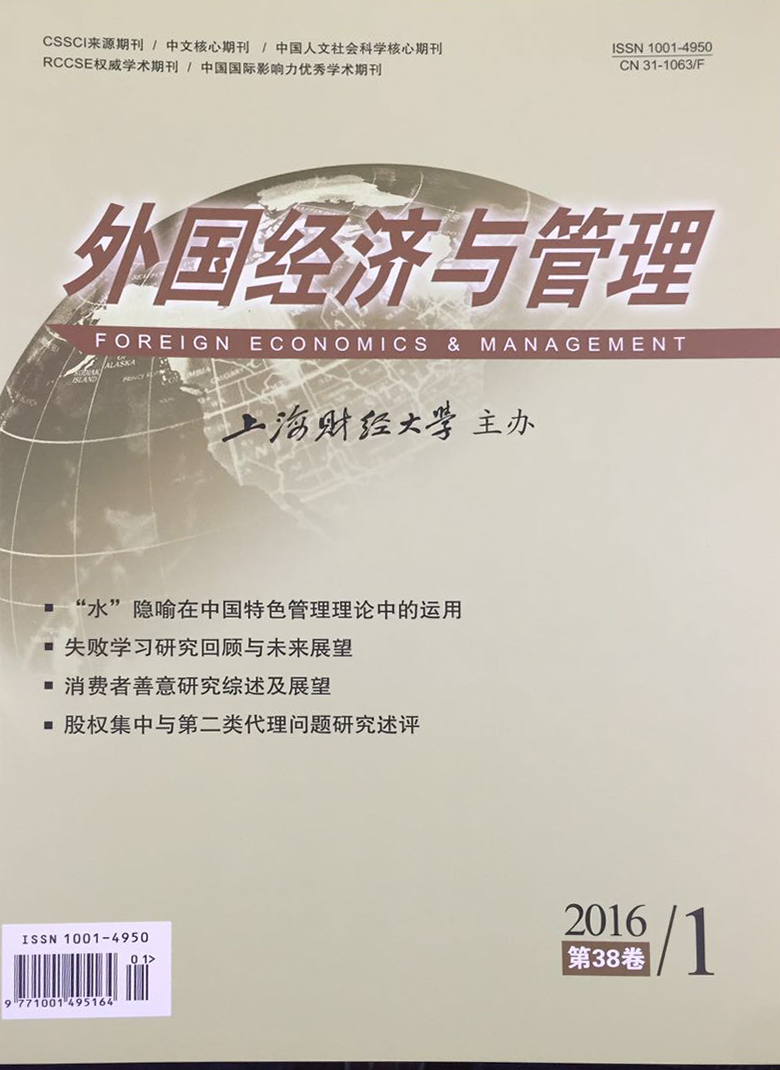近年来,传统职业生涯发展模式的改变及新的互联网学习模式的兴起,使职业生涯持续学习的重要性日益凸显,但目前国内学术界对这一主题的关注仍相对较少。本文通过梳理国外相关文献,对职业生涯持续学习的内涵、测量方法、个体及组织层面的前因及后果变量等方面的研究成果进行了总结,并对未来研究方向进行了展望。
职业生涯持续学习研究述评与展望
摘要
参考文献
1 ArthurM BHallD T and Lawrence B SHandbook of career theoryCambridge:Cambridge University Press1989
2 Arthur M B, Khapova S N and Wilderom C P M. Career success in a boundaryless world. Journal of Occupational Behavior, 2005, 26(2): 177–202
3 Brown A. Mid-career reframing:The learning and development processes through which individuals seek to effect major career changes. British Journal of Guidance & Counseling, 2015, 43(3): 278–291
4 Day C and Gu Q. Variations in the conditions for teachers' professional learning and development:Sustaining commitment and effectiveness over a career. Oxford Review of Education, 2007, 33(4): 423–443
5 Froehlich D E, Beausaert S A J and Segers M S R. Great expectations:The relationship between future time perspective,learning from others,and employability. Vocations and Learning, 2015, 8(2): 213–227
6 Gorges J and Kandler C. Adults' learning motivation:Expectancy of success,value,and the role of affective memories. Learning and Individual Differences, 2012, 22(5): 610–617
7 Hall D T and Mirvis P H. The new protean career:Psychological Success and the path with a heart. San Francisco,C A:Jossey-Bass, 1996 : 15–45
8 Hall D T and Chandler D E. Psychological success:When the career is a calling. Journal of Organizational Behavior, 2005, 26(2): 155–176
9 HorihanS JThe factors of career-related continuous learning and their relationships to job performanceMinnesota:Capella University2014
10 Hwan C B. Vocational interest:Its relationship to learning interest,learning style,and academic achievement of high school students. The Journal of Career Education Research, 2004, 17(2): 60–75
11 Kellogg S. Online learning:How to make a MOOC. Nature, 2013, 499(7458): 369–371
12 Kuhn G, Goldberg R and Compton S. Tolerance for uncertainty,burnout,and satisfaction with the career of emergency medicine. Annals of Emergency Medicine, 2009, 54(1): 106–113
13 Kuznia K D, Kerno Jr S J and Gilley A. The correlates and influences of career-related continuous learning:Implications for management professionals. Performance Improvement Quarterly, 2010, 22(4): 7–31
14 Kyndt E and Baert H. Antecedents of employees' involvement in work-related learning:A systematic review. Review of Educational Research, 2013, 83(2): 273–313
15 Laughton D. Work-based learning versus work-related learning. 2012, 4: 37–50
16 Law B. Career-learning space:New-dots thinking for careers education. British Journal of Guidance & Counseling, 1999, 27(1): 35–54
17 Lombarts K M J M H, Heineman M J, Scherpbier A J J A, et al. Effect of the learning climate of residency programs on faculty's teaching performance as evaluated by residents. PLOS One, 2014, 9(1)
18 London M. Toward a theory of career motivation. Academy of Management Review, 1983, 8(4): 620–630
19 London M. Redeployment and continuous learning in the 21st century:Hard lessons and positive examples from the downsizing era. The Academy of Management Executive, 1996, 10(4): 67–79
20 London M and Smither J W. Career-related continuous learning:Defining the construct and mapping the process. 1999, 17: 81–121
21 Major D A, Turner J E and Fletcher T D. Linking proactive personality and the big five to motivation to learn and deve-lopment activity. Journal of Applied Psychology, 2006, 91(4): 927–935
22 Maurer T J. Career-relevant learning and development,worker age,and beliefs about self-efficacy for development. Journal of Management, 2001, 27(2): 123–140
23 Nicely A, Palakurthi R and Gooden A D. Behaviors linked to high levels of hotel managers' work-related learning. International Journal of Contemporary Hospitality Management, 2011, 23(6): 764–783
24 Orndorff R M and Herr E L. A comparative study of declared and undeclared college students on career uncertainty and involvement in career development activities. Journal of Counseling & Development, 1996, 74(6): 632–639
25 Pazy A. Joint responsibility the relationships between organizational and individual career management and the effectiveness of careers. Group & Organization Management, 1988, 13(3): 311–331
26 Reisel W D, Chia S L and Maloles Ⅲ C M. Job insecurity spillover to key account management:Negative effects on performance,effectiveness,adaptiveness,and esprit de corps. Journal of Business and Psychology, 2005, 19(4): 483–503
27 Richter D, Kunter M, Klusmann U, et al. Professional development across the teaching career:Teachers' uptake of formal and informal learning opportunities. Teaching and Teacher Education, 2011, 27(1): 116–126
28 Rowold J and Schilling J. Career-related continuous learning:Longitudinal predictive power of employees' job and career attitudes. Career Development International, 2006, 11(6): 489–503
29 Rowold J, Hochholdinger S and Schilling J. Effects of career-related continuous learning:A case study. The Learning Organization, 2008, 15(1): 45–57
30 Rowold J and Kauffeld S. Effects of career-related continuous learning on competencies. Personnel Review, 2009, 38(1): 90–101
31 Schultz T W. Investment in human capital. The American Economic Review, 1961, 51(1): 1–17
32 Seibert S E, Kraimer M L and Crant J M. What do proactive people do?A longitudinal model linking proactive personality and career success. Personnel Psychology, 2001, 54(4): 845–874
33 Super D E and Hall D T. Career development:Exploration and planning. Annual Review of Psychology, 1978, 29(1): 333–372
34 Tones M, Pillay H and Kelly K. The link between age,career goals,and adaptive development for work-related learning among local government employees. Journal of Career Assessment, 2011, 19(1): 92–110
35 Tuschling A and Engemann C. From education to lifelong learning:The emerging regime of learning in the European Union. Educational Philosophy and Theory, 2006, 38(4): 451–469
36 WattsA GCareer development learning and employabilityNew York:Higher Education Academy20061118
37 Zimmerman B J. A social cognitive view of self-regulated academic learning. Journal of Educational Psychology, 1989, 81(3): 329–339
38 丁 桂凤. 员工自我调节学习影响因素之研究. 心理科学, 2005, 28(5): 1077–1081
39 龙 立荣, 方 俐洛, 凌 文铨. 企业员工自我职业生涯管理的结构及关系. 心理学报, 2002, 34(2): 183–191
40 (美)塞缪尔·H. 奥西普,路易斯·F. 2010 : 138
41 史晓白学习型组织与人力资本开发苏州:苏州大学2006
42 宋国世员工职业生涯高原对其知识分享的影响机制开封:河南大学2014
43 翁 清雄, 陈 银龄. 职业生涯幸福感概念介绍、理论框架构建与未来展望. 外国经济与管理, 2014, 36(12): 56–63
44 吴 遵民, 谢 海燕. 当代终身学习概念的本质特征及其理论发展的国际动向. 继续教育研究, 2004 (3): 31–36
45 赵 永乐, 何 莹. 中华文化价值观与成人的学习. 中国成人教育, 2012 (4): 19–21
引用本文
董薇, 秦启文, 王益富, 等. 职业生涯持续学习研究述评与展望[J]. 外国经济与管理, 2016, 38(1): 65–75.
导出参考文献,格式为:
上一篇:知识型领导研究述评与展望
下一篇:消费者善意研究综述及展望





 7231
7231  11996
11996

